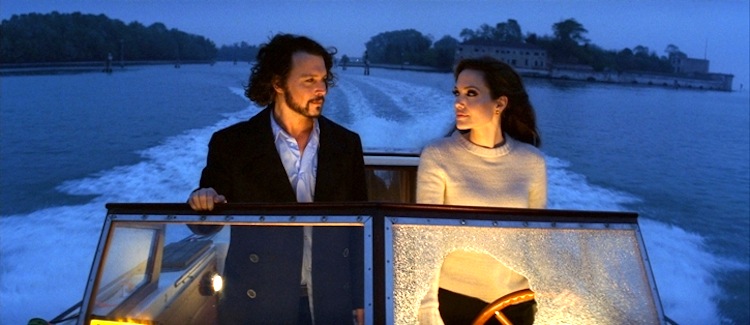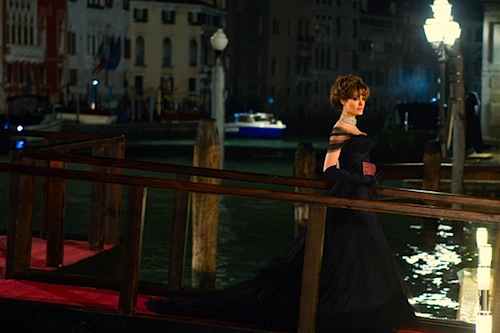By Jason Apuzzo. When you’re the biggest female movie star in the world, and your personal man-servant is Brad Pitt, you can order up a film like The Tourist – more or less as you would order up room service at The Ritz.
That’s the ‘truth,’ such as it is, behind the new Angelina Jolie star vehicle that opens today, co-starring – technically, at least – Johnny Depp, and directed (so the advertising claims) by Florian Henckel von Donnersmarck.
Because if the phrase ‘vanity project’ has any meaning, then it applies with full force in describing The Tourist.
That’s not necessarily such a bad thing, in so far as Ms. Jolie is a genuine star – albeit, occasionally a star in the same way that Medusa was a ‘star’ of Greek mythology, earning her points by way of force rather than charm. But in the strange world we live in, in which people like Sandra Bullock or Reese Witherspoon are routinely and incorrectly referred to as ‘stars’ (rather than as what they are, which is ‘actresses’) Angelina Jolie is the genuine article, and The Tourist only confirms that. If there ever was a woman the camera loves as she walks into a crowded ballroom, or as she skeptically raises an eyebrow at a would-be suitor, or as she fixes an appraising gaze on a man she intends to possess – and destroy? – then it’s Angelina Jolie.
The problem is, star vehicles don’t always make for good films – and at a certain point, they also corrode the star’s image. (Ask John Travolta about that.) The Tourist is almost – if not quite – a disaster, a woeful and expensive attempt to mimic charming romantic espionage capers of the past like North by Northwest, Charade or Arabesque; and in the generally misogynistic calculus of today’s Hollywood, Jolie likely can’t afford many more films like it.

There’s more to The Tourist than that, though. There’s also a kind of snarky, dismissive tone taken by the film toward America and Americans that left me with a bad taste in my mouth. More on that below. The bottom line is that whereas I was ready to pass this film off as a harmless failure, an expensive lark – now I’m actively rooting for it to fail.
Frankly, I hope The Tourist tanks.
I’ll go through the motions and describe the film’s ‘plot,’ although ‘plot’ in this film is strictly an afterthought. We start with Jolie, who’s in Paris being surveilled by Scotland Yard for reasons as yet unknown. The Scotland Yard team is led by Paul Bettany and Timothy Dalton (highly underrated as James Bond, I might add) – just two members of this film’s expensive supporting cast, which also includes Steven Berkoff and Rufus Sewell. Jolie gives Scotland Yard the slip, and finds herself on a train bound for Venice where she picks up Depp as a decoy to keep her pursuers guessing. Complicating matters is that a crime lord (Berkoff) who’s also pursuing Jolie mistakes Depp for a criminal who recently made off with about a billion dollars’ worth of his dirty money. Double-crosses, pseudo-adventure, predictable revelations and passing glances at romance ensue.

A few other things ensue, as well. One of the film’s motifs is that of Depp acting out as a bumbling, graceless and naive American in one of Europe’s most exotic and resplendent cities: Venice. (It’s simultaneously one of Europe’s grimiest and crassly commercialized cities; even Goethe was complaining about it back in the 1790s, long before there were Americans around to ruffle anybody’s feathers.) Depp plays the 2010 version of the ‘ugly American’ overseas, although in this case he’s more like the bumbling, gauche American – and The Tourist tries to play his ‘fish-out-of-water’ status for as many cheap laughs as possible.
It’s pathetic, and none of it works. It also happens to be obnoxious – a ‘look at the dancing American monkey’ routine – and immediately reawakened my dormant contempt for all-things-Depp.
By why restrict my venom to Depp? How about the director, Florian Henckel von Donnersmarck? You can stick a fork in him. His 2007 film The Lives of Others was a breath of fresh air on a challenging, politically incorrect subject (i.e., the legacy of communism in Europe). Whatever good-will he established with that film has now been swiftly squandered – and for what? To play personal valet to big-dollar American movie stars on a European holiday? To indulge in cheap anti-Americanism, so he can fit in better with the Malibu gentry?

Donnersmarck does not appear to have ‘directed’ his stars here at all, actually. Perhaps he was over-awed by the talent suddenly put at his disposal. Jolie swans through the film doing her usual routine – which is fine, it’s a good routine, except that she lacks the vulnerability here that she shows in her better roles. As for Depp, he really needed to be directed because – conventional wisdom to the contrary – he is neither Cary Grant nor Laurence Olivier, and needed to bring more discipline to his performance (beginning with cutting his hair, and getting a shave) in order to be convincing as a math teacher from Wisconsin.
The deeper problem here, though, is that Hollywood is long out of practice making films like this – and it shows. The Tourist feels like a tourist ride through other, better films – films with higher stakes (as during the ideological struggle of the Cold War; one thinks here of Alfred Hitchcock’s Torn Curtain with Paul Newman and Julie Andrews), or with more style (say, Mario Bava’s Danger: Diabolik). Donnersmarck doesn’t want to take too many chances here, though, and potentially risk his shiny new Hollywood career; ironically, his career may now get scuttled by this film.
The temptation to ‘go Hollywood’ is a strong one, one that only the most willful and stubborn can withstand. It’s probably very tempting even for an Oscar-winner like Donnersmarck, with serious things on his mind, to become – in effect – little more than another member of Angelina Jolie’s livery.
There are no doubt worse fates, but some of us were hoping for more from him.
Posted on December 10th, 2010 at 6:14pm.

Ouch. That’s gonna leave a mark.
Calling it as I see it.
Looks like Narnia is beating the crap out of The Tourist so far.
Hardly surprising.
That is an awesome review, Jason.
I was thinking about seeing this, but Johnny Depp was holding me back. Maybe I’ll just put the cash toward the “Charade” Criterion Blu.
Good call on Timothy Dalton. That reminds me: He’s playing an old Soviet spy in the show “Chuck.” Linda Hamilton is co-starring in this arc filled with Cold War nostalgia. It would be a good entry to your Communist Invasion alerts.
Thanks, Vince, as always!
Hey, I didn’t know any of that about Chuck! I’ll check that out. (Sheesh, this stuff’s more widepread than I thought …)
I apologize for getting off the subject of this blog, Jason. Looks like the reviews are in on Atlas Shrugged! I had to share this screed from Dark Horizons that clearly shows why it was important for Hollywood NOT to get it’s greasy hands on Atlas Shrugged.
Atlas Shrugged: Part One
Opens: April 15th 2011
Cast: Taylor Schilling, Grant Bowler, Matthew Marsden, Graham Beckel, Edi Gathegi
Director: Paul Johansson
Summary: Dagny Taggart, a railroad heiress, tries to save her company and faces increasingly corrupt government, her incompetent brother, and the systematic loss of her best workers. She soon suspects a sinister force working against her as a country-wide helplessness is spurred by the phrase – “Who is John Galt?”.
Analysis: The first attempts at an adaptation of Ayn Rand’s 1957 magnum opus began long before I was born. In 1972 Albert S. Ruddy wanted to film a version, Rand refused. Rand approved NBC’s proposed eight-hour mini-series back in 1978 but the network scrapped it. Rand attempt to adapt her own work into a script in the early 80’s, but died with only one-third of it complete. Her student was given the rights but knocked back one attempt. In 1992 he sold the rights to entrepreneur John Aglialoro who retains them to this day.
Aglialoro himself oversaw an attempted TNT mini-series in 1999 which fell through after the AOL/Time Warner merger, while in 2004 another film version fell apart – that version had the likes of Angelina Jolie and Charlize Theron linked. Things changed earlier this year as Aglialoro realised the studios weren’t going to get a film into production in time before the deadline on his ownership of the rights ran out. Thus in May this year came the announcement about this independently financed, first of a planned trilogy of films based on the property which would begin production on June 13th, literally two days before Aglialoro’s deadline.
With a budget said to be around $10 million, only five weeks of filming and no major stars – the obvious concern is that of quality. Actor Stephen Polk was originally slated to direct but was replaced at the last minute by “One Tree Hill” actor Paul Johansson whose only directing credits so far include twelve episodes of that teen drama and the TV movie “The Incredible Mrs. Ritchie”. The lead role of Dagny Taggart (a name that always conjures up the image of Dabney Coleman in my mind for some reason) ultimately went to little known but quickly rising Taylor Schilling, the female lead of NBC’s short-lived hospital drama “Mercy” and the upcoming Zac Efron-led Nicholas Sparks adaptation “The Lucky One”.
Aglialoro has indicated that one of the main reasons for doing this film independently is that he’s keen on staying as true to the novel as he can, whereas studios wanted to make some obvious changes. Staying true in this case could be detrimental. For all its popularity and status, ‘Atlas’ is also a famously self-indulgent exercise in literary masturbation. Rand uses a flimsy narrative mixed with colourful prose to incorporate her passionate if misguided thesis for objectivism – essentially a form of unbridled and unrestrained capitalism where self-interest is the only real rule. Gore Vidal, a man far more wise than either you or me, famously called it “nearly perfect in its immorality” – and this is the man who penned the oft-banned “Caligula”.
Getting people excited about a film that celebrates this philosophy could be hard, especially considering it asks people to sympathise and champion big business CEOs – those whose unrestrained greed caused the recent global financial crisis. The material is extraordinarily difficult on its own to adapt, for example the big climax is a speech over seventy pages long, and the man given the unenviable task is Brian Patrick O’Toole whose most notable work to date is as writer/producer on low-budget schlock like “Evilution” and “Cemetery Gates”. O’Toole mentioned in a forum posting that this film adapts the first 336 pages of the book and he did his “best to stay true to the spirit of Ayn Rand’s novel”.
It’s a noble sentiment but can’t hide the fact that this is one project that probably should’ve stayed on the shelf a bit longer. A book of this scale and ambition deserves a film of equal size and balls, what we’re getting is something that’s been heavily compromised and rushed into production to meet a legal deadline. Aglialoro may yet surprise us, but what’s not surprising is that with the low budget on offer, the first photos from the film are decidedly unimpressive and have a very TV movie feel to them. Whether this is seen as a bold vision or an absolute trainwreck, it’ll be interesting to watch nonetheless.
Well, this isn’t actually a review – it’s just speculation. I read this same piece from Dark Horizons a few days ago.
We’ll see what happens with this film. I certainly wish the filmmakers the very best, because they have an uphill battle ahead.
I was trying to convey that Hollywood’s preconceived notions will direct the tenor of the reviews for Atlas Shrugged. A lot of them have made up their minds already.
I agree with you.